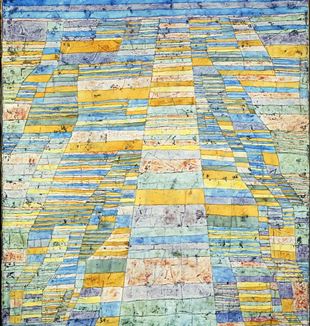
The Method of Christianity
Brandon shares how he came to know the charism of Fr. Giussani.In 2003, while browsing through a bookstall at a small Catholic conference in New Brunswick, Canada, I came across a strange-looking book with a peculiar title: “At the Origin of the Christian Claim.” It had an abstract Paul Klee painting on its cover, a stark contrast from the rest of the books which displayed pious images of Jesus and Mary and the Saints.
I thumbed through the book and found that it treated a topic that I had never quite considered before: the method that Jesus used in his ministry. It went on to claim that Jesus, who is alive, continues to work using the same method, and that we can encounter Him today, two thousand years later, in precisely the same way in which Peter, James, and John did. I bought the book and read it from cover to cover over the next few days, and re-read it a couple of times. In reading the book, I felt that I was encountering someone who knew me better than I knew myself and who could articulate, more faithfully than I could, what had happened to me.
At this point I had been a Christian for four years. I grew up Hindu, became an atheist, and converted to Christianity in Dubai before moving to Canada. If you had asked me in those days what led me to become a Christian, I would have told you that it was a powerful experience of the Holy Spirit. That may have been true, but what exactly did it mean? There was something unsatisfying in my own understanding of my story. It was because I had left out of my narrative—or at least, did not recognize—the vital role played by the specific people I met in Dubai through whom I encountered Christ. Giussani’s writing shed light on the human mediation of grace that was active in my life: it wasn’t simply magic that changed my heart and mind. Rather, I was given the company of specific people who looked at me a certain way, treated me a certain way—people without whom I would not have known what it was to experience the way Jesus looks at me. A vital component of the method of Jesus is a friendship in which you discover who you are and what you are made for—your humanity and your destiny.
I decided to Google this Giussani and learned that there was a movement associated with him, with the weird name “Communion and Liberation”. I found on their website that they had a Canadian chapter, and I filled out the contact form, explaining that I had come across this book and wanted to learn more. I got a cryptic email in reply: “Call me. – John” and a phone number.
The person I spoke to on the phone turned out to be a McGill University professor, John Zucchi. I was surprised to learn from him that Giussani’s books were read around the world by groups of people from all walks of life, and not just theologians or academics. When I asked what the Movement was about, he said, “It’s about encounter and friendship. Like you and me, right now!”
“Friendship?” I laughed. “I don’t even know you!”
“Well, I’ll come visit you,” he replied.
And so, a couple of weeks later, John flew down to Nova Scotia to meet me, and I was humbled that a professor from one of the country’s top universities would take the time to come all the way to meet a student miles away in another state. And in the stories we shared, we found surprisingly similar experiences that drew us to encounter Christ. I spent the following year reading everything by Giussani I could lay my hands on. But I didn’t really get a sense for the life of the Movement until I moved to Montreal a couple of years later. And the rest, I suppose, is history.
There are many for whom the Movement is their first point of contact with Christianity or the place in which they encountered Christ for the first time. That wasn’t quite the case for me. Instead, Giussani’s work and the life of the Movement educated me to recognize more fully how Christ was already active in my life, both in my past and in the various spheres of life I inhabited.
Fr. Giussani’s work continues to help me see more clearly and therefore to live more coherently. It really is a gift for the Church and for the world.
Brandon, Washington, D.C.